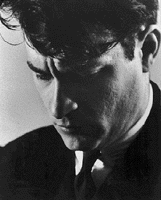On William Kapell By Virgil Thompson
New York Herald-Tribune
October, 1953Among musicians of his generation William Kapell, just thirty-one on Sept. 20, 1953, was one of the great ones. His career was at the point where he was no longer considered a mere boy genius but was recognized by his colleagues as a mature artist. At nineteen he was winning big prizes. At twenty he began his career as a touring recitalist and a much-in-demand orchestral soloist. But for a decade his repertory had remained heavily weighted with the easy-to-put-over works of Rachmaninoff, Tchaikovsky and Khatchaturian. It was only in the last two years that he had gained real access to the grand repertory of the piano, to the concertos of Mozart and Beethoven and Brahms and Chopin and to the suites of Bach and Debussy, and that he had been genuinely successful with that repertory.
Kapell had fought hard for this access and for this success. He had fought with his management and with the press. And he had wrestled with the repertory itself, not only alone but also with the counsel and the detailed cooperation of musicians who knew that repertory. He had studied, labored, consulted, digested, grown. Kapell had become a grown man and a mature artist, a master. He could play great music with authority; his readings of it were at once musically sound and genuinely individual. He had a piano technique of the first class, a powerful mind, a consecration and a working ability such as are granted to few, and the highest aspirations toward artistic achievement.
Kapell was conquering the world. In one decade he had won a world-wide audience. At the beginning of a second he was recognized as a master to be taken seriously in the great piano repertory. He was already laying plans (and operating, too) toward the renewal of the repertory through the application of his great technical and interpretive powers to contemporary piano music and through devoted co-operation with comtemporary composers. And his conquests were not easy. Few artists have ever battled so manfully with management or so unheitatingly sassed the press. He was afraid of nobody because his heart was pure.
It is not germane that as a man he was a good son and brother, a good husband and father and a loyal friend, though he was all these. What is important to music is that he was a great musician and a great fighter. He did not fight for himself or for just any music. He fought to play well and to play the best music. Also to take part in the creative life of his time. And he was winning, would have gone on winning, for he had a star.
He also had an unlucky star, else he would not have been taken from us. And our loss, music's loss, is irreparable. Other men of comparable genius and sincerity may arise; but none will ever take his place, because that place was unique. Kapell had built it to fit his own great talents. And built it, so that his talents could serve the whole world of music in their own particular and powerful way. Past services will remain and be of use to others. But Kapell himself, that huge life-force is dead; and his continuing musical presence will not be with us anymore.
